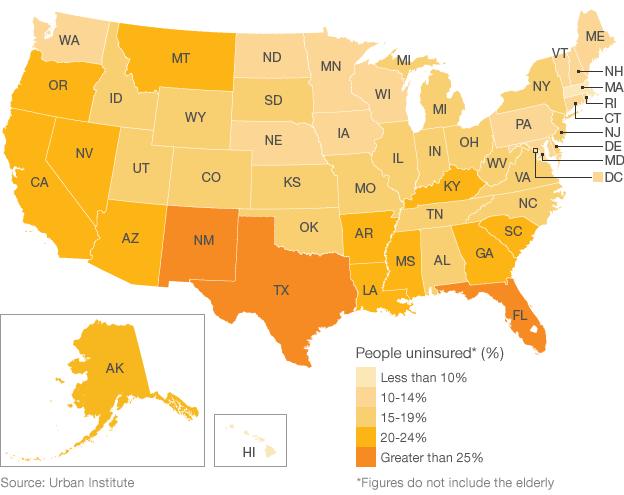US Supreme Court hears challenge to Obama healthcare law
- Published
- comments
Rival demonstrators at the Supreme Court made their voices heard as the arguments began.
The US Supreme Court has finished the first day of a landmark hearing on the constitutionality of President Barack Obama's signature healthcare reform.
Twenty-six US states are challenging the 2010 law, which greatly expands access to health insurance but is called unconstitutional by critics.
They say the requirement to buy insurance intrudes on civil liberties.
The court will hear three days of argument, with a ruling expected during June - in the thick of election season.
Monday's hearing focused on whether the judges actually had the power to rule on the case.
The justices spent 90 minutes actively questioning lawyers about an obscure 19th-century piece of legislation - the 1867 Anti-Injunction Act - which bars legal challenges to any tax that has not yet been collected.
The healthcare act requires most people to buy health insurance or pay a penalty. If the justices define that penalty as a tax, they could rule that the Anti-Injunction Act prevents the Supreme Court from making a ruling on the matter at this point in time.
The Washington DC court, which holds about 400 people, was packed with lawmakers, senior Obama administration officials and members of the public on Monday.
People had been camping outside the white marble building since Friday.
Controversial mandate
The nine Supreme Court justices, five of them appointed by Republican presidents and four by Democrats, have allotted six hours of argument - the longest in decades - for the case.
The court's proceedings are not televised, but daily <link> <caption>audio recordings</caption> <url href="http://www.supremecourt.gov/oral_arguments/argument_audio_detail.aspx?argument=11-398-Monday" platform="highweb"/> </link> and <link> <caption>transcripts</caption> <url href="http://www.supremecourt.gov/oral_arguments/argument_transcripts/11-398-Monday.pdf" platform="highweb"/> </link> are being made available.
It is one of the most politically explosive cases since the 2000 election wrangle that saw the White House awarded to Republican George W Bush over Democrat Al Gore, or the hearings on the 1974 Watergate tapes that led to President Richard Nixon's resignation.
The Patient Protection and Affordable Care Act, passed in March 2010, has been the divisive centrepiece of President Obama's term in office.
If upheld, the law would forbid insurance companies from denying coverage because of pre-existing medical conditions. It would also limit how much they can charge older people.
But the most controversial aspect of the law is its core requirement that most people buy health insurance or pay a tax penalty.
The healthcare law's insurance mandate does not begin until 2014, and those who flout the requirement to have insurance would not face a penalty until the following year.
Monday's hearing focused on whether the terms of the Anti-Injunction Act could mean the Supreme Court is currently barred from ruling on it.
Neither the government nor the challengers believe the 1896 law is applicable in this case, and the court appointed another lawyer to argue that case on Monday.
Several judges cast doubt on whether such a fine would constitute a tax - which correspondents saw as an indication that the court would not postpone the case.
Justice Stephen Breyer said that the fact the penalty would be "collected in the same manner of a tax doesn't automatically mean it's a tax, particularly since the purpose of the Anti-Injunction Act is to prevent interference with the revenue stream".
Justice Antonin Scalia seemed to agree, saying the court should rule on the matter unless there was a clear argument not to. "I find it hard to think this is clear, whatever else it is," he said.
The broccoli question
The most eagerly anticipated day is Tuesday, when the judges will hear arguments on the constitutionality of the individual insurance requirement.
Santorum: "This is the most important issue in this election"
The 26 states led by Florida say the federal government has no power to force individuals to buy health insurance.
Critics say that if Congress can require citizens to buy health insurance, it could also force consumers to eat broccoli, purchase gym membership or buy American-made cars.
However, the Obama administration says Americans who have no healthcare simply push their unpaid health bills upon taxpayers, who are forced to subsidise emergency room visits.
On Wednesday, two questions will be heard.
The first is whether, if the individual mandate is declared unconstitutional, the rest of the law can stand or must be struck down in its entirety.
The other is whether Congress unfairly burdened states when it expanded eligibility under Medicaid, the medical care programme for poor people.
A ruling on the intensely partisan issue is expected only several months before November's general election.
The US was the only major developed country without a national healthcare system until President Obama's reform.
<link> <caption>An opinion poll published on Monday</caption> <url href="http://thecaucus.blogs.nytimes.com/2012/03/26/poll-47-disapprove-of-health-care-law/?hp" platform="highweb"/> </link> found that 47% of voters disapproved of the healthcare law and 36% were in favour.
Republicans seeking to foil President Obama's bid for a second term have vowed to repeal it if elected.
Mitt Romney, who is the front-runner to be this year's Republican presidential candidate, called the law an "unfolding disaster for the American economy".
His rival, Rick Santorum, appeared outside the court after Monday's hearing to say that "Obamacare" should be the central issue of the forthcoming election campaign.
Who's uninsured? Health insurance rates across the US

- Published25 June 2012
- Published15 November 2011
- Published22 September 2011